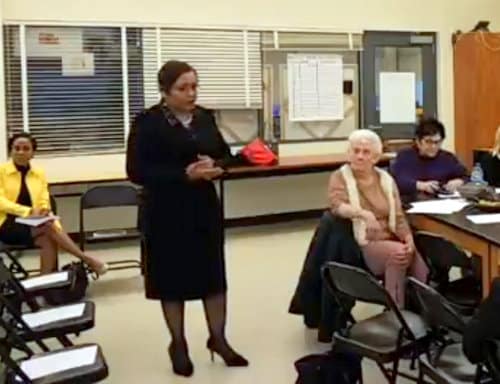Denise Charbonnet, the second candidate for the CEO position at New Orleans College Prep, proposed adding two or three schools to the charter network’s portfolio after improving its current campuses from a ‘C’ and ‘D’ rating to an ‘A.’
Charbonnet was most recently a school administrator in Norfolk, Va., but has previous teaching and administrative experience at numerous New Orleans schools before Hurricane Katrina. She told the College Prep governing board on Wednesday that she had toured the network’s four campuses — Sylvanie Williams and Crocker elementary, Cohen high school, and the Hoffman early childhood center — and spoken with administrators, faculty and students to prepare her ideas on how to lead the schools.
Cohen College Prep currently has a ‘C’ performance score and a 66-percent graduation rate, while Crocker has a D. Sylvanie Williams, rated an F, may be removed by the state from the College Prep charter network for its low performance next year.
“There’s nowhere to go but up,” Charbonnet said. “We know that we do not have that many sub-average students in these buildings.”
Within three years, Charbonnet said, Cohen should be rated an ‘A’ and have a graduation rate better than the national average of 83 percent. Crocker should have at least a B, and likely an A as well, Charbonnet said.
One of the most important tools to improving the schools will be a comprehensive needs assessment that should be complete within her first semester there, she said. That assessment would largely be undertaken through discussions with faculty and staff at each school, she said.
“I like to work collaboratively with the people in the trenches, in the buildings, and we come up collectively with the goals and objectives,” Charbonnet said. “…Believe me, we’ll be asking some very hard questions during this process.”
Charbonnet said she would also focus on improving student attendance, and improving targeted intervention for struggling students as well as an intensive push before state tests. The schools culture, however, did not seem to be one of its primary issues.
“I did look at the data for behavior, but it was good. I didn’t feel like we need to concentrate on it at this time,” Charbonnet said. “The immediate and concentated need should be on student achievement.”
Once the schools’ scores are stabilized, College Prep should pursue the addition of two or three more schools within its network — perhaps including a specialized middle school that can offer more extracurricular activities for older children than a K-8 elementary can, Charbonnet said. The network should also strive towards developing a stronger feeder pattern among its campuses, introducing Hoffman students to Crocker and Crocker students to Cohen long before they move up, she said.
Charbonnet’s previous job in Norfolk ran briefly into controversy, after the discovery that her previous time in Baton Rouge had included an ethics fine and that the school she led spent two years with an ‘F’ rating. That history was not discussed during her presentation, but another point drew some consternation from the board, her comments on teacher retention. Charbonnet said that her review of College Prep’s campuses showed “30 to 40” percent annual turnover in the staff, which she said was exacerbated by the charter system in Orleans Parish.
“Teacher retention problem with the charter schools come about with the fact that we have people in buildings that are not certified for the positions, and we don’t provide long-term contracts,” Charbonnet said.
Sylvanie Williams had high turnover amid the uncertain future of the school, but Cohen’s retention rate was 91 percent last year and Crocker’s was above 80 percent, College Prep administrators responded. Further, long-term contracts can be a “double-edged sword,” said board member Grisela Jackson, noting that she had observed teacher attendance falling among some given tenure.
“Public education in New Orleans has evolved from keeping tenured teachers,” Jackson said. “Some problems can arise when we had tenured teachers.”
Charbonnet said she had received the turnover data from the state’s database. She was not specifically advocating for long-term contracts, she said. She was simply noting that the lack of contracts may contribute to turnover, but her focus would be on solving it.
“In order to get maximum student achievement, there’s some stability that needs to happen,” Charbonnet said. “I believe in problem solving, and finding solutions to problems. If this is a problem principals are having, I’m willing to fight it tooth and nail.”
Board chair Peter Harding also questioned Charbonnet’s proposal to create a separate fundraising foundation for New Orleans College Prep. The network already raises $1 million a year that goes directly into school operations, and has a dedicated development director, so he questioned the value of an additional fundraising structure.
Charbonnet said the foundation was simply a suggestion that would obviously be discussed further with the board.
“I’m believing that fundraising was an issue,” Charbonnet said. “A foundation can only enhance that.”
Charbonnet’s presentation lasted about 20 minutes, with another 20 minutes of questions afterward. The board then entered a closed-door executive session to discuss her presentation further for about 15 minutes, then invited her to join that conversation for another hour.
Charbonnet is the second of three candidates for the position to speak to the board. Adam Meinig, founder of KIPP Believe middle school, made his presentation last week, and Joel Castro is scheduled to appear at 5 p.m. today (Thursday, Feb. 1). The board meetings are open to the public.

New Orleans College Prep CEO candidate Denise Charbonnet meets with the school’s governing board Wednesday, Jan. 31. (image from video by Robert Morris, UptownMessenger.com)